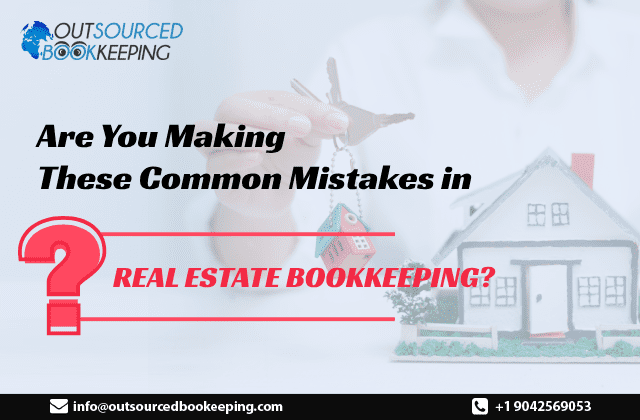Real Estate is a fortune-acquiring scalable business. However, to reap its benefits you must go through the testing process, enhanced with effective finance management. This is a crucial yet challenging process, compelling you to prepare budgets, create various financial reports, perform audits, monitor cash flows, and file taxes. If you are solely handling all these accounting challenges ( Real Estate Bookkeeping) as a business owner it might become nerve-racking.
However, accurate and updated financial records are the pillar to your company’s success, yet there are many bookkeepers like you who have made common errors that have resulted in adverse consequences. So, to effectively avoid common decision-making errors, this blog explores those common pitfalls and also helps you rectify them to avoid them in the future.

Insignificant Bookkeeping Mistakes of the Real Estate Industry that Create Significant Impacts
The following shows the unconscious mistakes investors and real estate agents run into while bookkeeping:
-
Poor Record Maintenance
This is a common mistake when it comes to real estate bookkeeping where you just don’t have the time to meticulously organize the records to track the expenses and income. As a result, negatively impacts your decision-making since your financial situation is not accurately pictured.
The consequences might lead to missing a deduction entitled to them or being unaware of repaying any missed payments. Moreover, you cannot stay ahead of the taxes, lose control over budgets, and lack clarity while making investment choices.
The antidote for this situation is to log each of your transactions into the bookkeeping system immediately. Then review it to check whether you are meticulously updating it without mistakes. Alternatively, you can opt for tools to automate this process so that you can spend less time worrying about details and focus on other aspects of your real estate business.
-
No Independent Bank Accounts
Carrying out transactions mixing personal and business accounts might not seem like a major hurdle. But with time, the overlap of the two might put you in deep trouble since it becomes hard to keep track of the business transactions and then segregate them into the book of records. To avoid this ambiguity it’s best to separate both accounts to know cash inflow and outflow. Also, it helps to make tax calculations easier for both your accounts too!
-
Having a Poor or Compromised Backup
The demand of the digital age you live requires even investors and real estate agents to work with tools to manage business operations and improve the structure of accounting in real estate. But with the implementation of technology comes relevant IT problems that may threaten your valuable data.
Therefore, be sure to back up your financial and other important information to avoid being hit by a sudden loss. Failure to comply with this strategy can result in loss of client information and important financial data.
Fortunately, with digitalization, modern bookkeeping comes with pre-corporate backup accounts for you to maintain scanned receipts and generate original data in a few seconds. So, seize the power of digitalization and its solutions to enjoy data- backup and also the power to resist sudden cyber threats of server failures.
-
Improper Employee Classification
This is another error of bookkeeping where employee classification becomes an oversight in the eyes of real estate investors (real estate bookkeeping). It is a known fact that real estate investors do require employees and independent contractors to keep the business operations afloat.
But keeping them classified properly helps you to avoid misfiling of taxes or pay more taxes. So, the growth of the company increases the emphasis on orderly employee classification which can help you better while adhering to official tax calculations.
-
Not Hiring a Professional Bookkeeper
Managing real estate assets often cannot be solely done by you and requires hiring bookkeeping services because there are higher chances that you may fall into a trap. On the other hand, if you hire a bookkeeper you can help your business succeed in making profits. A skilled and experienced bookkeeper can notice where you are overspending and help you rectify it so that you can avoid the risks due to overspending for your future developments.
On the other hand, without a bookkeeper, you can run into severe tax implications with improperly tracked expenses or inaccurate financial data. That’s why investing to hire a qualified bookkeeper is essential to keep your finances checked and updated to create long-term strategies for your real estate bookkeeping business portfolio.
Conclusion
In the fast-paced world of U.S. real estate, even small financial missteps can have a big impact on your bottom line. From missed deductions to disorganized records, improper bookkeeping can lead to avoidable tax burdens, compliance issues, and lost profits.
Whether you’re managing a growing portfolio or just starting out as a landlord, staying on top of your finances is key to standing out in today’s competitive market. Take control by investing time in accurate bookkeeping—or better yet, partner with a trusted outsourced bookkeeping service. Let the pros handle the numbers while you focus on scaling your real estate business, securing better deals, and maximizing returns.
Don’t let financial oversight slow down your success. Make smart moves—start with clean books.








